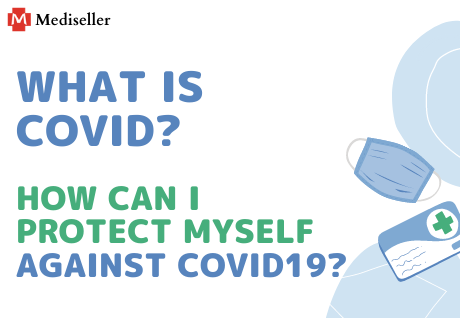Coronavirus disease (or COVID-19) is a highly infectious disease caused by the recently discovered SARS-CoV-2 virus. The first known case of Coronavirus was identified in Wuhan, China in 2019.
You might be wondering why write an article on COVID this late? We’ve been living with and fighting COVID-19 for more than a year now and you’d expect the general public to be aware of what COVID is and how to stay safe.
Unfortunately, a large chunk of the population is still unaware of what exactly COVID-19 is or what it does to you. To top it off, a lot of misinformation is spread across social media causing mass hysteria. bel
Overview
The SARS-CoV-2 virus or severe acute respiratory syndrome coronavirus 2 belongs to the family of coronaviruses. Coronaviruses are generally not dangerous even though some cause infections.
However, the SARS-CoV-2 virus is highly contagious and spreads through person-to-person contact. It causes severe infection in the respiratory tract either an upper respiratory tract infection or a lower respiratory tract infection.
SARS-CoV-2 is one of the seven identified types of coronavirus. Coronaviruses are responsible for diseases like MERS( Middle East respiratory syndrome) and SARS (Severe acute respiratory syndrome).
Symptoms
Symptoms of Covid-19 vary and sometimes it can even be asymptomatic, which makes Covid extremely dangerous. However, the commonly seen symptoms include,
-
Fever
-
Cough
-
Headache
-
Fatigue
-
Breathing trouble
-
Loss of smell and taste
-
Chills
-
Body Aches
-
Sore throat
About a third of patients showed no symptoms. Whereas, amongst the ones who developed symptoms 81% had mild symptoms sometimes leading up to mild pneumonia.
14% of patients with symptoms had severe symptoms like hypoxia or dyspnea. The rest showed critical symptoms including, multiple organ failure and respiratory failure.
Symptoms alone cannot be used to confirm or deny the presence of Covid. Diagnosis of Covid is therefore done via tests like nucleic acid tests.
Covid Strains and Variants
Mutations in a virus result in what is called a variant. Strains and variants are often used interchangeably and are almost similar except for very subtle differences. Strains tend to behave differently from the parent virus while variants differ only by structure.
As of now, three major variants of Covid-19 have been detected, namely the UK variant, Brazilian Variant, and South African Variant.
Preventing Coronavirus
Preventing the spread of Coronavirus is vital to put this pandemic to an end. Following some simple and effective methods in combination will significantly reduce your chances of contracting the virus.
Wear a mask
Studies show that facemasks are about 79% effective in preventing the transmission of Coronavirus. Exercise caution while wearing and taking off masks. Sanitize your hands before and after touching a mask.
Wear the mask so that it covers your mouth and nose, tie it behind your head, keeping it snug. Medical experts recommend that everyone above two years wear masks in public.
Wearing masks does not mean immunity from Covid-19, so follow other Covid protocols as well.
Social Distancing
Coronavirus is spread from person to person contact, mainly through the air we breathe. But experts suggest that coronavirus only travels less than 6 feet through the air. So maintaining a distance of 6 feet from others will to a fault reduce the chances of contracting Covid-19.
People with no symptoms may also carry the virus, hence make no exceptions.
Avoid crowds
Do not step out of your house unless necessary and avoid crowded places if you do go out.
Poorly ventilated spaces may potentially still carry the virus, so avoid those too.
Maintain good hygiene
Wash your hands with soap regularly. Use a sanitizer if you can't access soap and water.
Wash your hands after you have sneezed, coughed, or been in a public place. Wash your hands thoroughly before eating or preparing food, touching your face, handling masks, or caring for a sick person.
Carry surface disinfectants to disinfect any object or surface in a public place before touching them.
Get Vaccinated
Covid-19 vaccines approved by the WHO or your government healthcare department will help keep Covid-19 at bay. However, do not stop following Covid protocols even after getting vaccinated; one can never be too careful.
Final thoughts
Following all of these methods will ensure your safety from Covid-19 to a large extent. But it is common to be careless at times, so always have an eye on your general health. If you notice any symptoms, do get medical help as soon as possible.



.png)
.png)
.png)
.png)
.png)
.png)
.png)
.png)


0 Comment